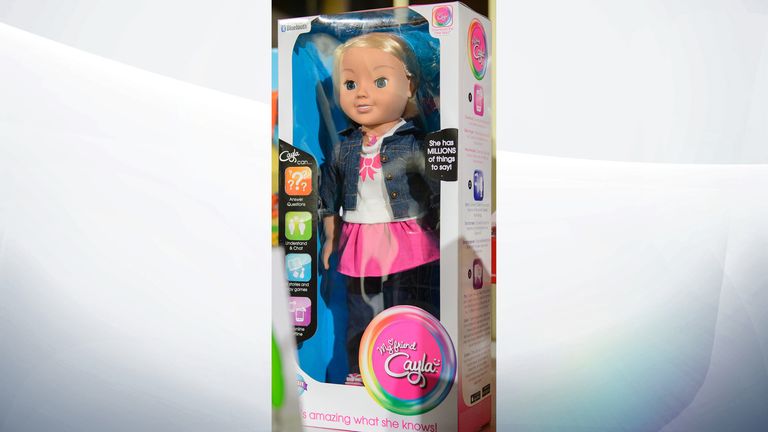Germany tells parents to destroy doll over spying fears
Germany bans 'My Friend Cayla' over concerns the software inside could be hacked, allowing personal data to be accessed.
Saturday 18 February 2017 06:11, UK
Parents in Germany who bought their children a talking doll are being urged to destroy it due to spying fears.
There are concerns the software inside 'My Friend Cayla' could be hacked, allowing personal data to be accessed.
The technology, which allows a user to chat to the doll, carries a risk of espionage and could compromise privacy, said the country's Federal Network Agency.
The organisation's chief Jochen Homann said: "The Cayla doll is banned in Germany.
"This is also about protecting the weakest members of society."
The doll has a microphone and its software means it can respond to a person's questions by accessing the internet.
Researcher Stefan Hessel alerted the agency after examining the toy, which was created by American company Genesis Toys.
He said hackers could use an unsecure bluetooth device embedded in it to listen and talk to the child playing with it.
Mr Hessel told German website Netzpolitik.org: "In a test, I was able to hack the toy even through several walls. It lacks any security features."
The UK Toy Retailers Association said it is "satisfied that this product offers no special risk and there is no reason for alarm".
It added: "We would always expect parents to supervise their children at least intermittently.
"We understand (distributor) Vivid Imaginations has reassured the public there are factual inaccuracies in the German publicity and they have restated the toy is perfectly safe to own and use when following the user instructions."
In December, the Electronic Privacy Information Center (EPIC) filed a complaint to the US Federal Trade Commission about Cayla.
EPIC claims the "toys subject young children to ongoing surveillance" and violate privacy and consumer protection laws.




